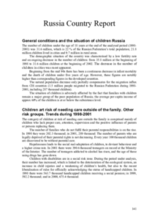Country report of Russia on the situation of children in residential care in anticipation of the Second International Conference on Children and Residential Care: New Strategies for a New Millennium, to be held in Stockholm 12 – 15 May 2003.
The number of children under the age of 18 years at the end of the analysed period (1998-2001) was 31.6 million, which is 22% of the Russian Federation’s total population; 21.8 million children lived in cities and 9.7 million in rural areas. The demographic situation of the country was characterised by a low fertility rate and an ongoing decrease in the number of children: from 35.8 million at the beginning of 1998 to 31.6 million children at the beginning of 2002. The decrease in the number of children in cities was most apparent.
Beginning from the mid 90s there has been a continuous decrease in infant mortality and the death of children under five years of age. However, these figures are notably higher than corresponding figures in the developed countries.
The natural population decrease only partially compensates for the migration influx from CIS countries (1.5 million people migrated to the Russian Federation during 1998-2001, including 287 thousand children).
The situation of children is adversely affected by the fact that families with children remain a major group of the poor population of Russia; the average per capita income of approx 60% of the children is at or below the subsistence level.

